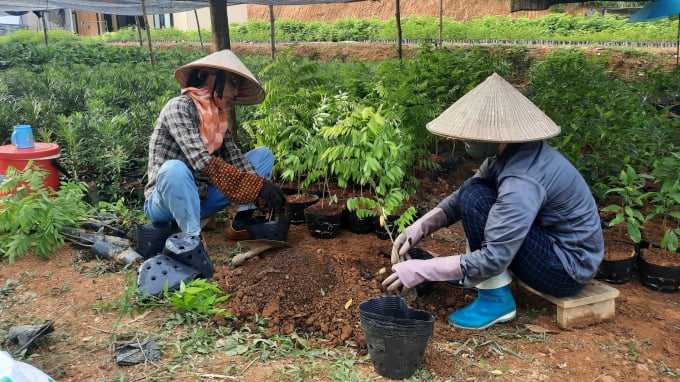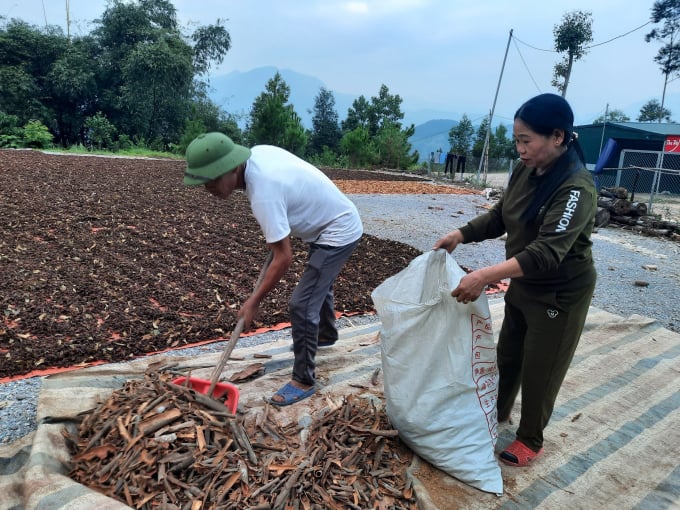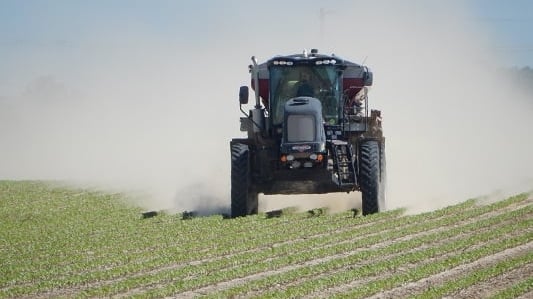May 17, 2025 | 23:31 GMT +7
May 17, 2025 | 23:31 GMT +7
Hotline: 0913.378.918
May 17, 2025 | 23:31 GMT +7
Hotline: 0913.378.918
Quang Ninh had a large area of forest, ranking 18th out of 63 provinces and cities in Vietnam. Forest cover reached 55% as 379,000 hectares were covered with forests which acted as a green belt to protect the country’s border, prevent natural disasters, adapt to climate change and create stable income.
To expand the area of hardwood forest, over the past years Quang Ninh has developed policies to encourage forestry development and afforestation. Ba Che district making up one third of the province’s forest area was as an example. It formed a steering committee to implement a project for planting hardwood forests in all communes, giving assistance to the locals in terms of technique, seedlings as well as facilitating them to access loans for planting forests. Thus, acacia trees have been quickly replaced by hardwood ones like cinnamons, star anise and iron wood trees.

Basically, the local cooperatives provide enough seedlings for afforestation in Ba Che district. Photo: Nguyen Thanh.
So far, more than 7,000 hectares of new forest including nearly 1,500 hectares of hardwood tree have been planted in Ba Che. In addition, nearly 200 households in the district have received the total amount of over VND3.8 billion in support to plant 300 hectares of cinnamon and other types of hardwood tree. Particularly, in the tree-planting festival on the New Year occasion, hundreds of households registered to plant nearly 1,000 hectares of hardwood forest.
The expansion of special use forests and natural reserves will play a part in protecting forests, maintaining forest cover, preserving hardwood forests as well as contributing to the adaption to climate change.
Two years since the project on planting hardwood forests was implemented, Quang Ninh province has planted nearly 1,5000 hectares of forest, thereby creating jobs and stable income for more than 60,000 forestry workers, maintaining social security, order and safety in the border areas. The project has changed forest structure in forestry industry in a positive way by increasing the area of indigenous and hardwood trees; thereby improving the productivity, quality and value of the forest.
In fact, the expansion of hardwood forests for wood processing industry has been limited. Besides, it was bound by many strict regulations such as the size of forest must be at least 50 hectares for enterprises and cooperatives or at least 3 hectares for individuals and households. Producers can get support two times for the entire period of planting forest and they are only eligible for receiving the second assistance if they increase forest area by at least 50% of the first planting area. Moreover, they must commit to maintain the area, not to cut down trees ahead of schedule. However it usually takes a long time for the producers to get the return of the initial investment while most of them are not in comfortable circumstances.

Binh Lieu farmers are harvesting cinnamon. Photo: Nguyen Thanh.
In a bid to eliminate the limitations, Quang Ninh’ forestry sector is actively implementing a project for restructuring and improving the economic efficiency of planted forest. Accordingly, the People’s Committee of Quang Ninh province will finance the entire cost of seedling but not exceeding VND15million per hectare for planting hardwood forests and indigenous trees. The province will support the entire cost of seedling, input materials and 50% of labour cost but not exceeding VND45 million per hectare for converting productive forests to protective ones.
In recent years, forest area of Quang Ninh has been protected and expanded. Forest cover has increased year by year. Planting hardwood forests as well as converting softwood forests into hardwood ones have become the foundation for the effective exploitation of the province’s natural and socio-economic conditions. Therefore, planting hardwood forests has opened up broad prospects and opportunities for highly competitive forest products in the market both domestic and international.
The initial results in moving from softwood forests to hardwood ones in Quang Ninh have changed people’s awareness of the benefits of planting hardwood forests, especially in the remote, border and island areas.
Quang Ninh province has taken drastic and synchronous measures to protect and develop forests over the past years. Its effort to protect the “green lung” is also a way to benefit environment, climate and landscapes as well as build stable livelihoods for locals in the short and long terms.
Quang Ninh’s forest production value reached more than VND1,2 trillion every year, up nearly 10% compared to the 2018-2019 period. The province planted over 22,000 hectares of concentrated forest, protecting more than 330,000 hectares of existing forests; exploiting nearly 830,000 cubic meters of wood from planted forests. The average income of forestry employees was above VND70 million per year.
Translated by Mai Tham

(VAN) Hue City rigorously enforces regulations regarding marine fishing and resource exploitation, with a particular emphasis on the monitoring of fishing vessels to prevent illegal, unreported, and unregulated (IUU) fishing.

(VAN) Hanoi People's Committee has issued a plan on reducing greenhouse gas emissions in the waste management sector with 2030 vision.

(VAN) Vietnam's draft amendment to Decree No. 156 proposes a mechanism for medicinal herb farming under forest canopies, linking economic development to population retention and the sustainable protection and development of forests.

(VAN) In reality, many craft village models combined with tourism in Son La have proven effective, bringing significant economic benefits to rural communities.

(VAN) The international conference titled Carbon Market: International experiences and recommendations for Vietnam was successfully held recently in Ho Chi Minh City.

(VAN) According to the Project on rearranging provincial and communal administrative units, in 2025, the country will have 34 provinces/cities, 3,321 communes, wards, and special zones, and no district-level organization.

(VAN) The vice president of fertilizer with Stone X Group says the Trump administration’s tariffs are impacting fertilizer markets.